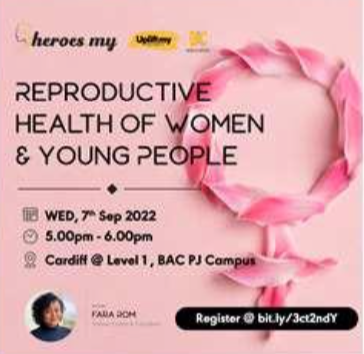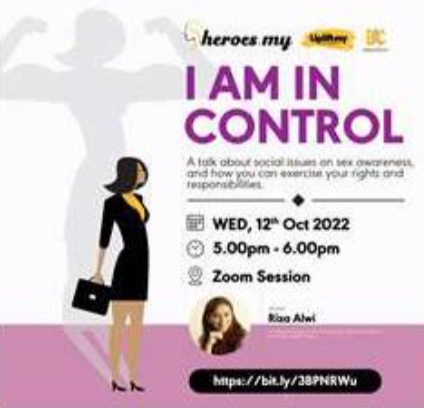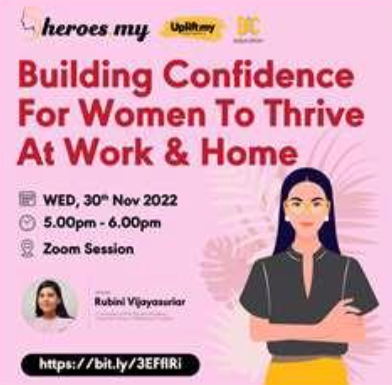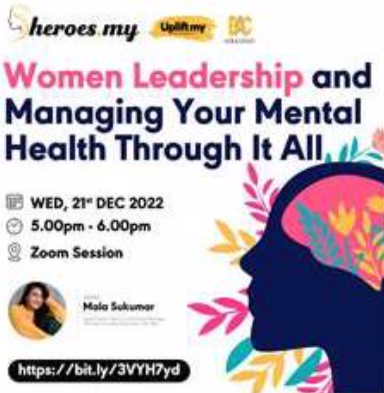Sheroes.my Empowering Series of Online Talks on Gender Equality
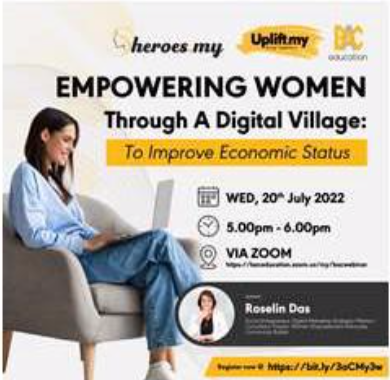
In 2022, UPLIFT (Pertubuhan Bangkit) took a bold step towards fostering gender equality by organising a series of online talks aimed at addressing key issues affecting women in Malaysia and globally. These talks, held from July to December 2022, focused on topics such as economic empowerment, sexual and reproductive health, sexual harassment and women’s leadership. The initiative aligned with United Nations Sustainable Development Goal 5 (SDG 5), which calls for gender equality and the empowerment of all women and girls.
This series of discussions brought together thought leaders, activists and experts to share insights and strategies on how to achieve gender inclusivity and support women’s rights. The talks were designed to raise awareness, spark dialogue and encourage concrete actions that address gender disparities in various sectors of society.
Aiming for Gender Equality: Themes and Topics Covered
The series focused on diverse issues affecting women across socioeconomic and cultural backgrounds. Each online session brought attention to specific challenges while also offering practical solutions to empower women and girls in Malaysia and beyond. Some of the most significant themes covered include:
Economic Empowerment of Women:
- Held on July 20th, 2022, this session explored the ways in which economic independence can transform the lives of women and their communities. The discussion centered on how women can gain access to better employment opportunities, equal pay, entrepreneurship resources and financial literacy.
- Economic empowerment is key to breaking the cycle of poverty for many women in marginalised communities. The talk also highlighted the barriers women face in accessing financial tools and the importance of creating inclusive policies that promote financial equality.
Sexual and Reproductive Health:
- Hosted on July 27th and again on September 7th, these talks focused on raising awareness around women’s sexual and reproductive health rights, a topic often surrounded by stigma in many societies. Speakers provided valuable insights into the importance of access to healthcare, education on reproductive rights and the role of policymakers in ensuring that women’s health is prioritised.
- The discussions emphasised how lack of access to reproductive health services affects women’s overall well-being and socio-economic standing. It further highlighted the importance of breaking taboos around reproductive health to ensure women can make informed decisions about their bodies.
Sexual Harassment and Women’s Safety:
- Sexual harassment, both in the workplace and in public spaces, remains a pressing issue. The talk held on August 10th and again on October 12th, 2022, sought to address this persistent problem. The sessions discussed legal frameworks, support systems and the importance of fostering a culture of zero tolerance towards harassment.
- Speakers emphasised the need for comprehensive training and awareness programs in workplaces and schools, highlighting the roles of both men and women in creating safer environments. Legal experts also discussed the rights and protections available to victims of sexual harassment.
Women’s Leadership and Confidence Building:
- On November 30th and December 21st, the talks shifted to focus on empowering women in leadership roles, exploring the systemic barriers that prevent women from reaching positions of influence in both corporate and political spheres. The discussions featured women leaders who shared their experiences and offered guidance on overcoming obstacles, building self-confidence and navigating traditionally male-dominated industries.
- Confidence building was identified as a critical factor in encouraging more women to pursue leadership roles. The talks provided practical strategies for women to develop leadership skills, build networks and foster mentorship relationships.
Inclusivity and Intersectionality:
- The session on August 24th, 2022, emphasised the importance of inclusivity in the women’s rights movement. The talk explored how gender inequality is further compounded for women who belong to marginalised groups, such as those from racial minorities, the LGBTQ+ community or women with disabilities.
- Speakers underscored the need for an intersectional approach to gender equality, where the unique experiences of all women are acknowledged and addressed. The discussions advocated for policies that embrace diversity and inclusivity, ensuring that no woman is left behind.
Impact and Reach of the Online Talks
The UPLIFT series of online talks attracted a diverse audience, including students, professionals, activists and policymakers. The sessions were held via Zoom and live-streamed on social media platforms, enabling broad participation and engagement from both local and international viewers. Through these talks, UPLIFT successfully created a platform for meaningful dialogue on the barriers women face and the actions that can be taken to dismantle those barriers.
One of the key outcomes of the series was the increased awareness around gender inequality and the steps that individuals, organisations and governments can take to address it. The sessions also provided an avenue for women from different walks of life to share their experiences, inspiring others to take action in their communities.
Additionally, UPLIFT’s initiative sparked several follow-up programmes and collaborations with NGOs, educational institutions and private organisations aimed at tackling specific gender-related issues identified during the talks.
The Road Ahead: Continuing the Conversation
While the 2022 series of talks brought significant attention to issues affecting women, the conversation around gender equality is far from over. UPLIFT remains committed to advancing the dialogue and building on the momentum created by the series. Plans are already underway to host more events in the coming year, focusing on deepening discussions around gender inclusivity, leadership and economic empowerment.
UPLIFT’s Online Talks on Gender Equality were not just a platform for conversation—they were a call to action. As the organisation continues to champion women’s rights and gender equality, these talks have become a foundation for further initiatives that aim to create a more inclusive and equitable world for women and girls.


